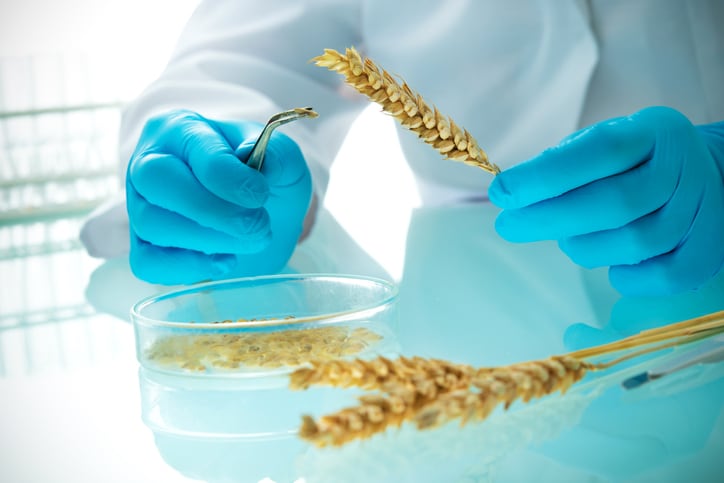The UK’s Environment Secretary George Eustice announced the launch of a 10-week consultation on the future of gene editing at the Oxford Farming Conference.
Both gene editing and genetic modification are banned by the EU. With the long Brexit process now concluded, Eustice said the consultation could ‘unlock substantial benefits to nature and the environment, helping farmers produce more resilient crops and to produce healthier, more nutritious food’.
“Gene editing has the ability to harness the genetic resources that mother nature has provided, in order to tackle the challenges of our age. This includes breeding crops that perform better, reducing costs to farmers and impacts on the environment, and helping us all adapt to the challenges of climate change,” he said.
“Its potential was blocked by a European Court of Justice ruling in 2018, which is flawed and stifling to scientific progress. Now that we have left the EU, we are free to make coherent policy decisions based on science and evidence. That begins with this consultation.”
According to the government, the consultation will focus on stopping certain gene edited organisms from being regulated in the same way as genetically modified organisms (GMOs), as long as they could have been produced naturally or through traditional breeding.
Aside from gene editing, the consultation will also begin a longer-term project to gather evidence on updating our approach to genetic modification by gathering information on what controls are needed and how best to deliver them.
Gene editing vs genetic modification
While research has not currently indicated any heightened risk from gene editing, it’s believed the EU restrictions reflect the strong-anti GMO sentiment among European consumers.
Advocates, however, contend that gene editing should be treated differently from GMOs. Gene editing processes such as crispr CAS essentially act as a pair of molecular scissors that are used to remove undesirable genetic code from DNA. In contrast, genetic modification includes the introduction of a new, foreign gene.
‘Critical’ in helping farmers achieve net zero
The 10-week consultation was welcomed by the NFU farmers’ union. It said that gene editing could help farmers adapt to the challenges of climate change by, for example, reducing the use of pesticides and animal fertilisers.
NFU Vice President Tom Bradshaw said: “New precision breeding techniques such as gene editing have the potential to offer huge benefits to UK farming and the environment and are absolutely critical in helping us achieve our climate change net zero ambition.
“In our drive to achieve net zero by 2040, these new tools could help us address pest and disease pressures on our crops and livestock, increasing our resilience in the event of extreme weather events, as well as reducing our impact through a more efficient use of resources, resulting in lower emissions and less waste.”
He said new biotechnologies could also enable the development of foods with much more direct benefit to the public, such as healthier oils, higher vitamin content and products with a longer shelf life. “We know that on its own gene editing will not be a silver bullet, but it could be a very important tool to help us meet the challenges for the future,” he added.
'Healthy food requires fertile soil, not GE'
But the Sustainable Food Trust warned gene editing ‘will further narrow gene pool and intensify food and farming systems’.
“There is an erroneous conviction that through plant breeding we can somehow magically develop plants which are drought and disease resistant, salt tolerant and at the same time produce increased quantities of nutrient dense food,” said CEO Patrick Holden. “This is simply gravity-defying nonsense. The precondition for the production of healthy food is a fertile soil, but the gene editors have forgotten this and instead are hell-bent on perpetuating the extractive industry which modern farming has become.”
The UK organic certification board OF&G added the organic sector’s ‘profound environmental benefits’ should not be ignored as it called for a wide range of views to be ‘properly considered’ in the consultation.
Chief Executive Roger Kerr said: “It’s concerning that GM and GE are being openly addressed by the prime minister and environment secretary as though it’s already part of agricultural policy. We worry the consultation is simply paying lip service to a deal that’s already been done. And that is simply not acceptable.
“A survey last autumn by the Agricultural Biotechnology Council showed that almost half (48%) of the people surveyed didn’t have faith in, and were not supportive of, new plant breeding techniques, such as GE. Why would UK agriculture want to exclude almost five out of 10 consumers from their market?”
He added there was of lack of peer-reviewed, independent research to back up the government’s claims that GE could benefit the environment and produce healthier, more nutritious food for consumers.
“Science has shown the climate and ecological crisis is having serious, negative effects on our food production systems. GE isn’t a responsible, proven solution,” he said. “More government funding for research into organic, whole food system methodologies should be considered before embracing unproven technologies.”





